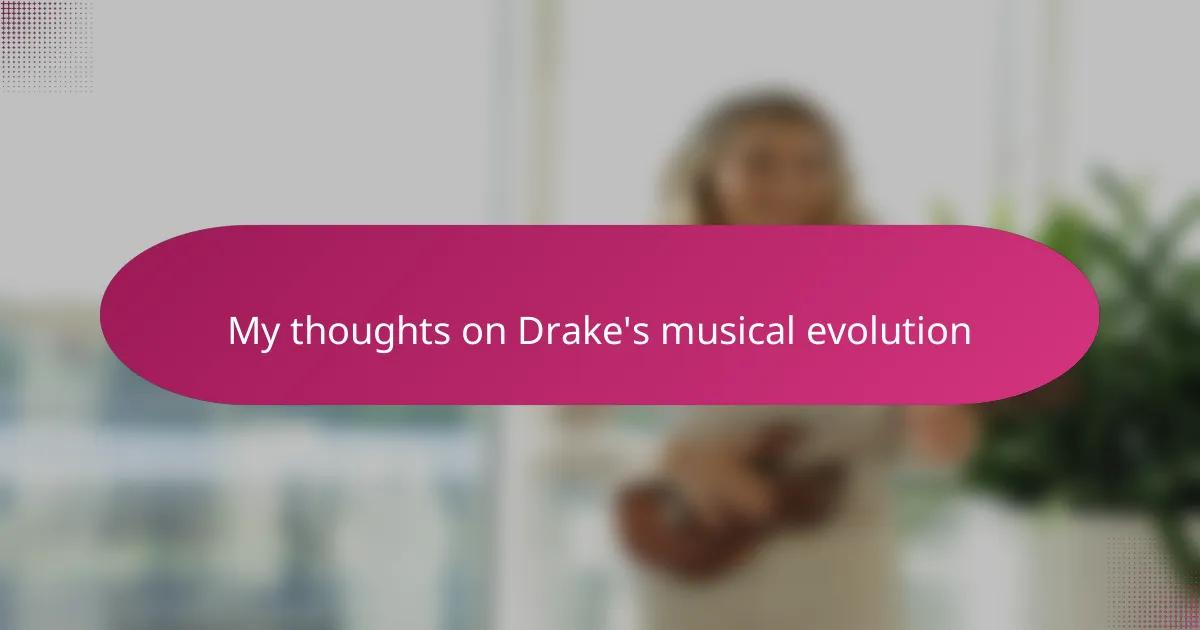Key takeaways
- Drake’s rap style evolves from introspective storytelling to a confident, melodic fusion of rap and R&B, reflecting his personal journey.
- His music career progressed from raw vulnerability in early mixtapes to polished and experimental sounds in recent albums, showcasing lyrical maturity.
- Drake has significantly impacted contemporary rap by promoting emotional transparency and blending genres, influencing a new generation of artists.
- His journey exemplifies the importance of adaptability, vulnerability, and the balance between innovation and consistency in artistry.
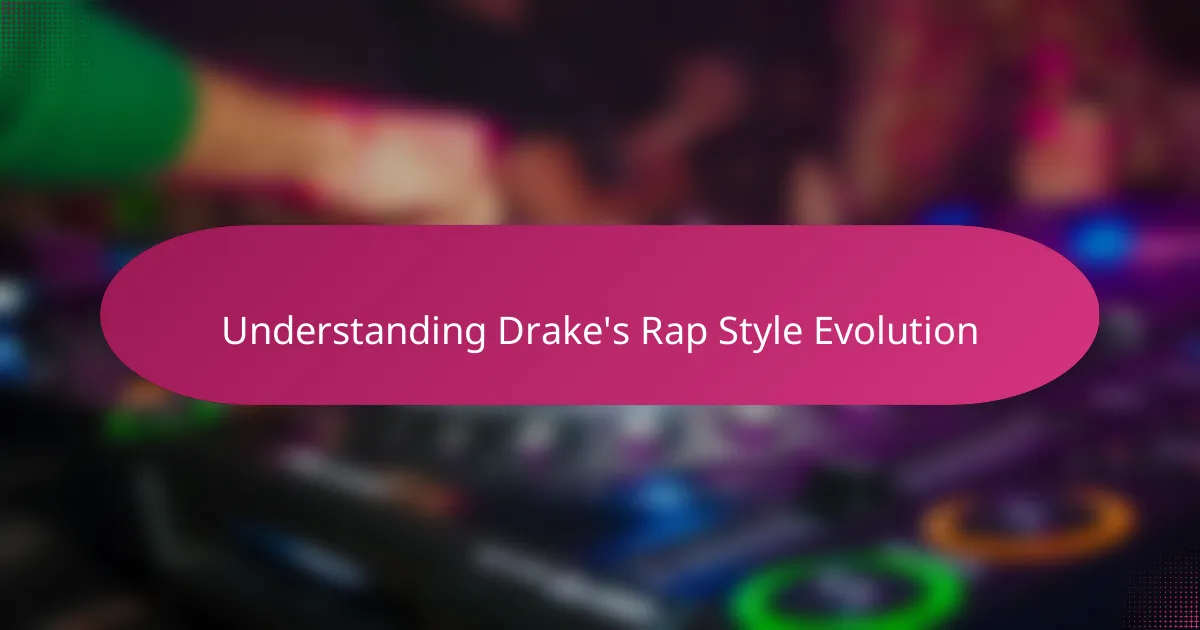
Understanding Drake’s Rap Style Evolution
Drake’s rap style has always fascinated me because it’s so fluid and adaptable. Have you noticed how he effortlessly switches from introspective storytelling to catchy punchlines? I remember the first time I paid close attention to his early mixtapes; his raw emotions felt so genuine, which made his evolution even more impactful.
What strikes me is how his style blends singing with rapping, creating that signature melodic flow that some people love and others debate about. It’s like he breaks traditional rap boundaries, making you wonder where rap ends and R&B begins. This fusion wasn’t common when he started, yet he made it feel natural, pushing the genre forward in ways few artists have.
Reflecting on his growth, I think Drake’s rap evolution mirrors his personal journey—more introspective, confident, and experimental over time. Each album feels like a chapter of his life, showing vulnerability and ambition side by side. Doesn’t that make you appreciate not just his talent but the storytelling behind every rhyme?
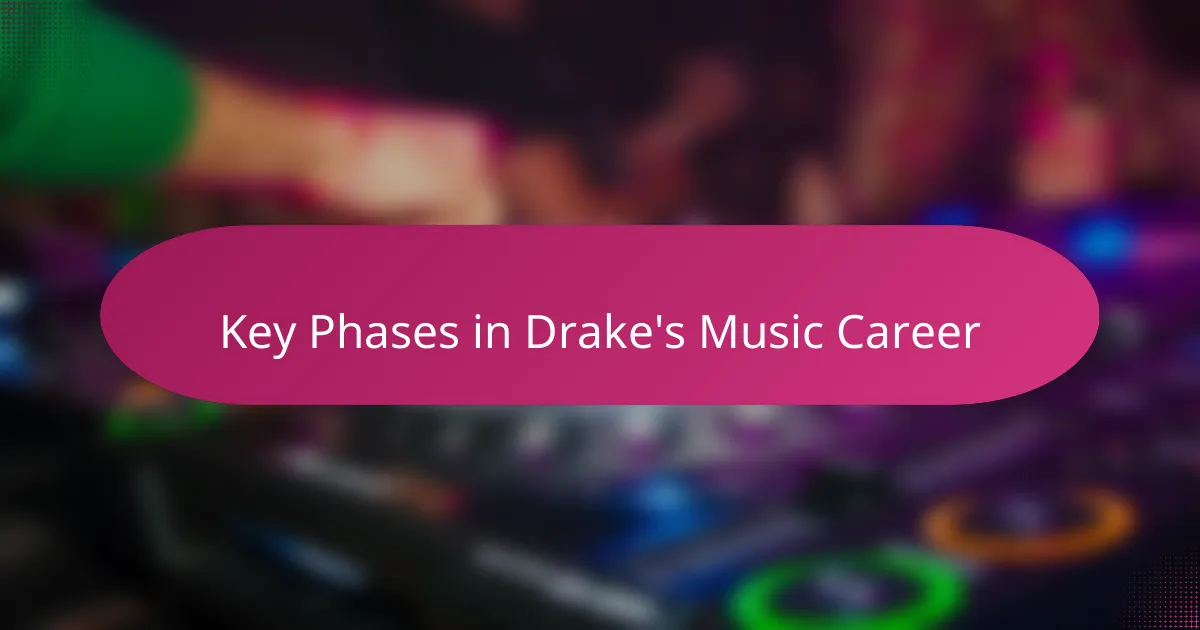
Key Phases in Drake’s Music Career
Drake’s career really took off during his early mixtape days, like with “So Far Gone.” I remember how those tracks felt raw and personal, almost like he was inviting us into his world for the first time. It was a moment when you could hear both his vulnerability and hunger to make it big.
Then came his leap into mainstream success with albums like “Take Care,” where his sound became more polished but still deeply emotional. I often think about how this phase showed his ability to blend hip-hop with moody, atmospheric beats, creating something fresh that resonated widely. Have you noticed how his themes during this time often grappled with fame and relationships?
Later, Drake shifted again, embracing a more confident, even swagger-filled persona with projects like “Views” and “Scorpion.” I find this stage fascinating because it highlights his versatility—he’s not just vulnerable anymore; he’s commanding the spotlight with hits that dominate charts and cultural conversations. Don’t you feel like this phase marks his full evolution into not just a rapper, but a global icon?
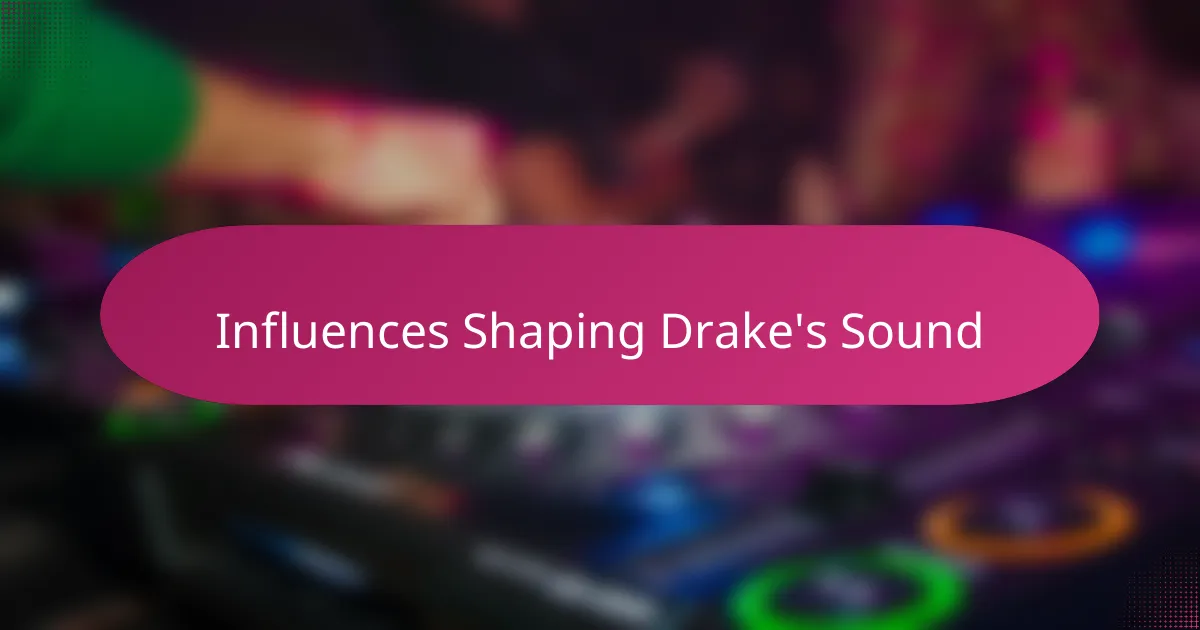
Influences Shaping Drake’s Sound
When I think about the influences shaping Drake’s sound, I can’t help but notice how Toronto’s diverse music scene plays a huge role. Growing up amidst everything from dancehall to grime and Canadian hip hop, he absorbed a wide palette of rhythms and vibes. It’s like he carries a little bit of the city’s multicultural energy in every track.
Drake’s openness to experimenting also seems deeply influenced by artists outside traditional rap circles. I mean, his collaborations with producers known for R&B or electronic music show he’s not afraid to blur genres. That willingness, to me, speaks to an artist who’s always searching—never settling for the usual.
And then there’s the emotional honesty he channels, which reminds me of the early 2000s hip hop and soul I used to listen to. Those artists taught him how to convey vulnerability without losing strength. It’s this blend of heartfelt lyrics with innovative sounds that makes his evolution feel so authentic—don’t you agree?
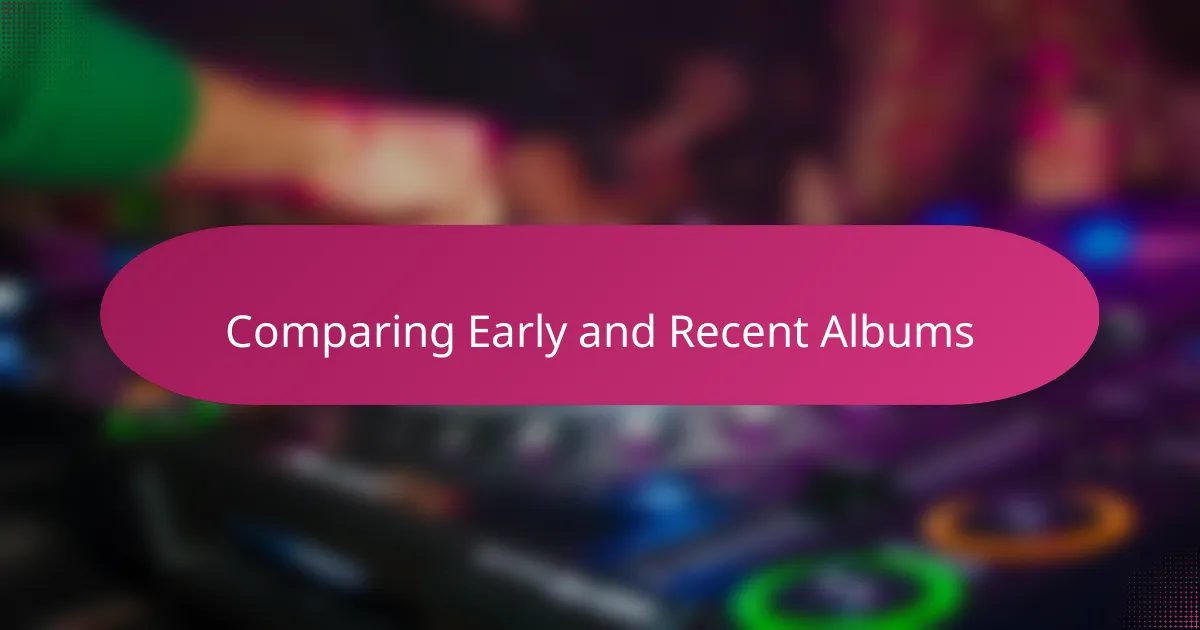
Comparing Early and Recent Albums
When I listen to Drake’s early albums like “Thank Me Later” and “So Far Gone,” I hear a young artist still finding his footing, with a rawness that’s hard to ignore. There’s an emotional vulnerability that feels fragile but sincere, almost like he’s confiding in you through his music. Have you ever felt that kind of intimacy in an artist’s early work before they become huge?
Fast forward to his recent albums such as “Certified Lover Boy” and “Honestly, Nevermind,” and the shift is unmistakable. His sound has become more polished, experimental, and sometimes even playful, showing confidence that only years in the industry can bring. I find it fascinating how he manages to stay relevant by balancing innovation with that classic Drake emotional depth.
What really stands out to me is the lyrical maturity between those early and recent projects. The themes have broadened—from the initial focus on personal struggles and relationships to a more panoramic view of fame, legacy, and cultural influence. Isn’t it impressive how his music reflects growth not just as an artist but as a person navigating changing life circumstances?
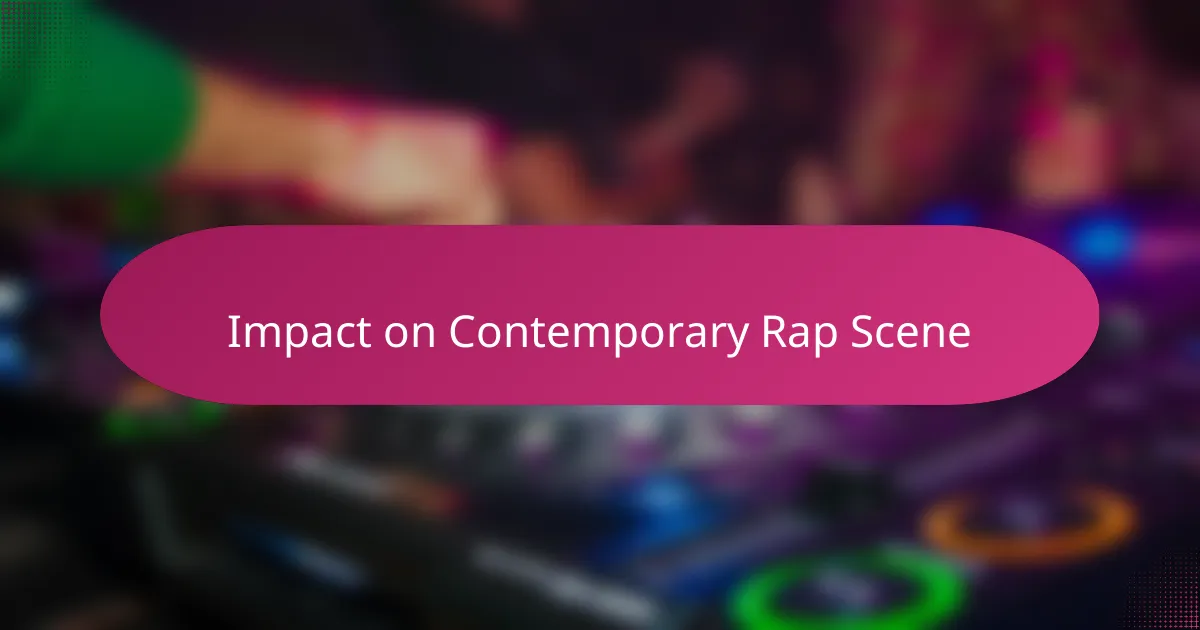
Impact on Contemporary Rap Scene
Drake’s impact on the contemporary rap scene is undeniable, in my view, because he redefined what it means to be a rapper today. I remember when artists mostly stuck to either hard-hitting bars or smooth melodies, but Drake blurred those lines so effortlessly that now, it feels like the norm. Have you ever thought about how many rappers today owe their melodic flows to him?
What fascinates me even more is how his emotional transparency has opened doors for vulnerability in rap, which was once seen as a weakness. I have seen how more artists now embrace introspection without losing their street credibility, and I believe Drake played a big part in that shift. Isn’t it refreshing to hear rap that’s both raw and reflective?
Also, the way Drake commands charts and cultural conversations simultaneously shows a savvy understanding of the music industry’s evolution. From my experience following the scene, few artists balance mainstream success with authentic artistry like he does. Don’t you think that kind of influence shapes not just music, but the entire rap culture?
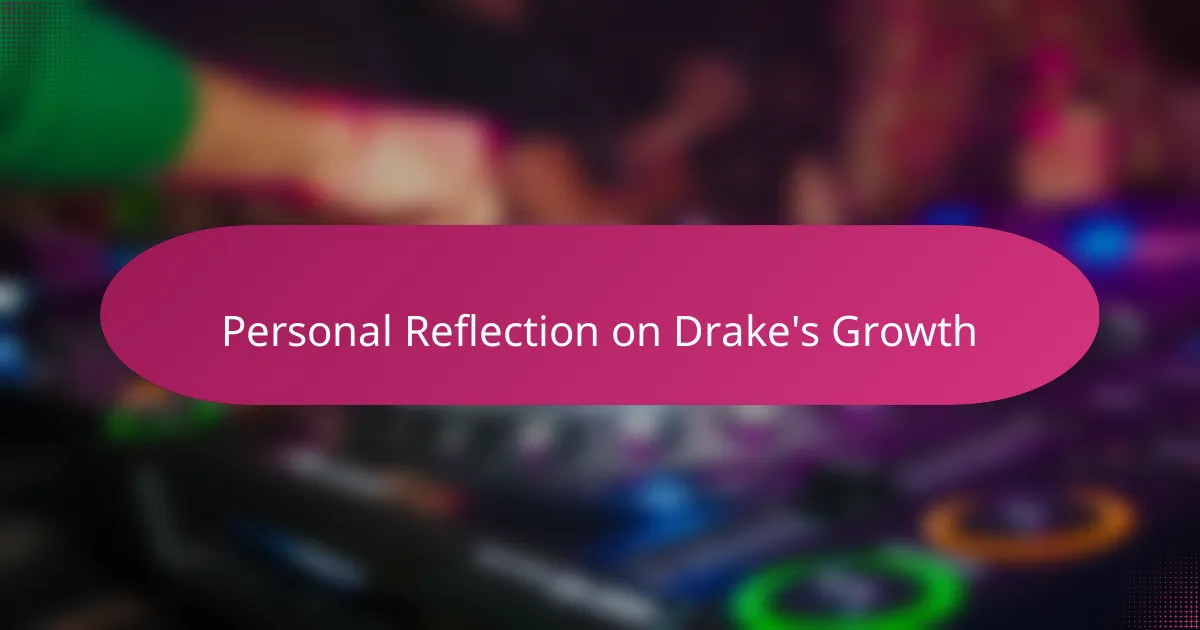
Personal Reflection on Drake’s Growth
Looking back, I find Drake’s growth incredibly inspiring because it feels so relatable. There were moments when I saw him struggle with self-doubt and vulnerability, and over time, he transformed that into a confident voice that still stays true to his emotions. Have you ever followed an artist and felt like their journey mirrored your own in some unexpected way?
What really resonates with me is how his personal growth isn’t just about fame or success—it’s reflected deeply in his music’s tone and themes. When I listen closely, I can almost trace his evolving mindset, from introspection to more assertive self-expression. It’s like watching someone grow up in real time, right before your ears.
Sometimes, I wonder if that kind of evolution is what keeps his music fresh and relevant. From my experience, artists who don’t change often get left behind, but Drake’s willingness to experiment while staying emotionally honest feels like the secret to his lasting impact. How often do we see that balance so perfectly executed?
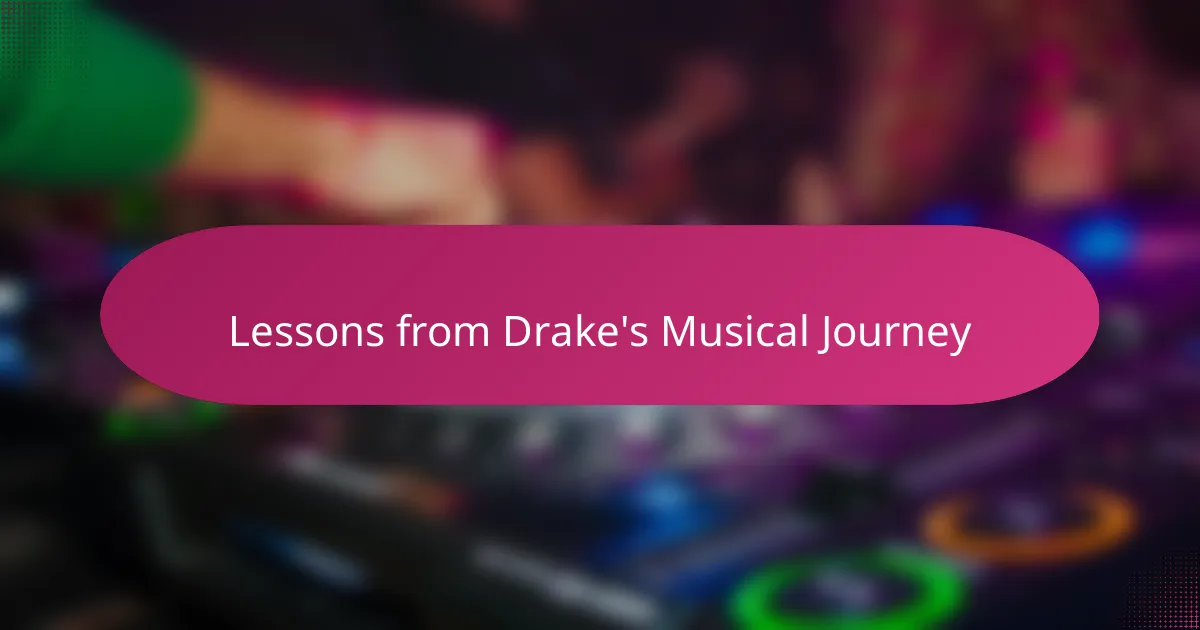
Lessons from Drake’s Musical Journey
Drake’s musical journey teaches me a lot about the power of reinvention. Watching him shift styles and embrace new sounds without losing his core identity shows how important it is to stay true yet open to change. Have you noticed how he never seems stuck in one place creatively? That’s a lesson in adaptability I find invaluable.
Another thing I’ve learned is the value of vulnerability in artistry. Drake’s willingness to expose his emotions—his fears, doubts, and triumphs—makes his music resonate on a deeply human level. I often wonder, would his impact be the same if he’d stuck only to bravado and swagger? For me, it’s that honesty that makes his evolution so compelling.
Finally, Drake’s journey highlights the importance of balance between experimentation and consistency. He tries new things, sure, but always keeps a connection to what made him unique. From my experience, this balance is crucial for growth without losing your audience. Have you ever seen an artist nail that tightrope walk like Drake does? I think that’s what sets his evolution apart.
